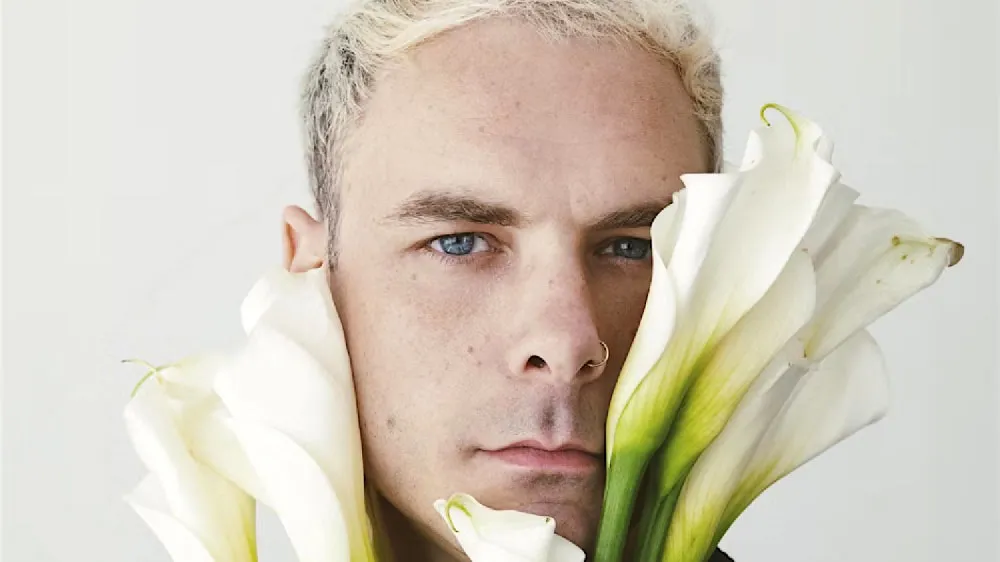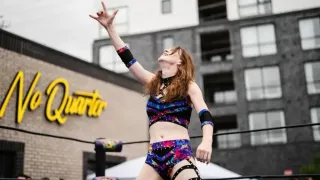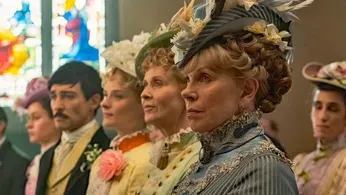
Jun 19
Everything New is Old Again as 'The Gilded Age' Season 3 Dawns
Kilian Melloy READ TIME: 8 MIN.
The upcoming season of HBO's period drama "The Gilded Age" continues to pit new money against old and progressive ideals against staid traditions as questions of love matches and marriage continue to occupy place of pride. Gender roles come under negotiation, youth rebels against age, and, as the twentieth century draws near, even assumptions about marriage creep into the picture.
In other words, the 1870s setting of the show, which mostly dwells among the monied upper crust of New York City and the social machinations they get up to – powered by the financial might of the so-called "robber barons" and super-wealthy industrialists of the time – serves as a handy mirror for the economic anxieties and social upheavals of our modern world. Everything new, to invert the saying, is old again thanks to how series creator Julian Fellowes and his co-writer, executive producer Sonja Warfield, craft the show's scripts.
Both Fellowes and Warfield, along with members of the show's cast, were on hand for a recent press conference in which the next chapter of the show was teased, its characters and their relationships explored, and insights into the narrative texture of the new slate of episodes offered.
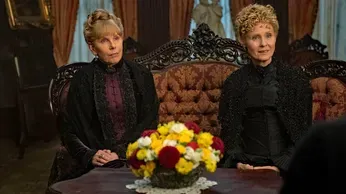
Source: Cynthia Nixon and Christine Baranski in 'The Gilded Age'
As Season 3 dawns, there's a new order coalescing in the Van Rhijn household... or, rather, the Forte household, since Oscar (Blake Ritson), the closeted son of the long-widowed Agnes (Christine Baranski), has lost the family's money at virtually the same time as Agnes' sister, Ada (Cynthia Nixon), newly widowed, comes into possession of a fortune and takes on the household's expenses. Tensions descend as the downstairs inhabitants – butler, maid, cook, and clever Jack (Ben Ahlers), the footman and aspiring inventor – try to puzzle out who, exactly, the boss is now... a question that the sisters themselves struggle to resolve.
"I'm always rather fascinated by people who pretend that the loss of money, the loss of position doesn't affect them at all, that everything can just go on as it did before," Fellowes mused. "So, of course, it can't... But here we have Agnes, [with her] belief in the essentially European concept of greatness by birth that can't be shifted."
"It's not good news for Agnes," Baranski noted, "but it's great news for Christine and for Christine and Cynthia... You know, when the royalty falls off the throne, it makes for a good story making and it also makes for delicious comic moments." Turning to Nixon, she added, "We've had a lot of fun with it, haven't we?"
Nixon agreed that "it is really fun, as Christine says, to put these characters... in a wildly different situation and watch them flounder and scramble and try and fake it till they make it."
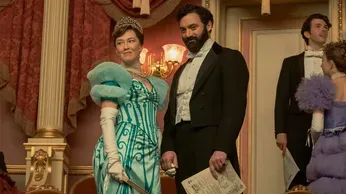
Source: Barbara Nitke/HBO
Domestic discord also rules across the street in the recently constructed mansion belonging to the Russell family. Businessman and patriarch George (Morgan Spector) is in Arizona, laying the groundwork for a bold new railroad plan that could transform America, while social position-obsessed Bertha (Carrie Coon) is relentlessly pursuing a visionary agenda of her own: Marrying daughter Gladys (Taissa Farmiga) to an English nobleman and, in so doing, opening up a whole new level of social and political influence. It's as grand a plan as George's business dealings – something that Bertha isn't shy about telling her entrepreneurial husband – but it creates friction within the family.
"I personally find it hard to let go of the sort of marital harmony the two of them have had for two seasons and found myself really searching even in the scenes when we were in conflict for connection between the two of us," Spector said. He took note of a fundamental irony – that "the rift that develops between them is not a minor one... and what is being expressed through that disagreement are the same shared values and the same shared ambitions that brought them... together in the first place."
"George can't really understand the stakes for a woman," Coon said, taking up Bertha's side of the argument. "The woman's purview is very different. He doesn't understand our instinct for survival, which is, in this case, through marriage, and that Bertha really believes what she's doing is an existential question.
"She wants her daughter to be safe," Coon continued. "She also wants her to be fulfilled and have a sense of purpose, because I think Bertha knows what it feels to have that capacity thwarted... she's hungry for her daughter to have a kind of power she didn't have."
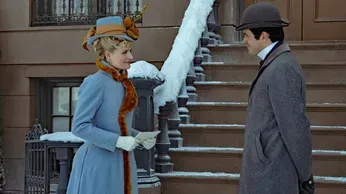
Source: Karolina Wojtasik/HBO
Romance, as ever, is in the air: For all the focus on Gladys and the prospect of her marrying well, there's another possible pairing that could see son Larry Russell (Harry Richardson) wed for love... and wed none other than Agnes and Ada's orphaned niece, Marian (Louisa Jacobson). But will any of the old guard stand for such a match, assuming it even pans out?
"I think what's really special about their relationship is that they have the opportunity to grow as friends first," Richardson said of the two young characters, before taking note of how extraordinary that friendship is since "they didn't have the space to be able to go out on the town or to get to know each other before they started seeing each other in a romantic light.
"I think their dynamic's written very beautifully," Richardson added, "they really start with that, that foundation of friendship and that foundation of care for each before they start contemplating a romance."
The elders of the show tend to view love as a poor reason for a marriage, but Nixon, reflecting Ada's innate kindness and romanticism, spoke up for the rebellious streak among the show's younger set, pointing out that "when the series started, the ruling generation were so at odds with each other, but the young people seem much more reasonable and not caught up in that and were able to forge alliances... there is a wonderful conspiratorial quality among the young people that don't get caught in the older generation's nonsense and can see past it."
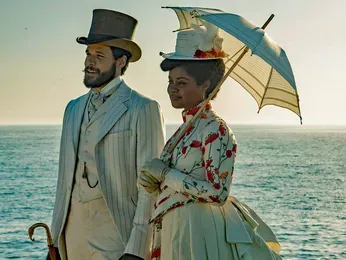
Source: Barbara Nitke/HBO
Matters of the heart also complicate the life of Marian's friend – and Agnes' secretary – Peggy Scott (Denée Benton) when a bout of flu results in her meeting a charming doctor, William Kirkland, played by new cast member, "Charmed" alumnus, and Broadway star Jordan Donica. What's more, the show leans into the racial prejudices of the time; Peggy is from an upper-class Black family (as is Dr. Kirkland), but even so, when her parents have occasion to stop by the Van Rhijn household there's a moment of tension around the question of whether they will come in through the front door. To Agnes, Ada, and Marian such questions are pure foolishness; that's not so for everyone of their era.
"I think that Julian planting the seed of this Black elite world in our show, and it getting to blossom into this garden with all of us watering it, is just astounding," Benton said, adding that "people are learning history, I'm learning history, and I feel like I'm getting to embody something really important."
"I just feel so blessed," newcomer Donica said. "Everyone was so welcoming and so respectful and so caring and kind and thoughtful." The actor praised how "vivid" the scripts by Fellowes and co-writer and executive producer Sonja Warfield are, and lavish kudos on the "amount of attention to detail that everyone takes... everyone who touches this amazing show in any way." That extended to the show's historical accuracies: "I do a lot of period pieces, and I always do research on what people who look like me were doing in time and space during that and it's not always welcomed into a room."
Added Donica: "I never really looked at African American history beyond what we're taught in school, and so to realize that there were free Africans here, and there have been Africans here and many other types of peoples here in the Americas long before slavery got here, has been such an educational experience."
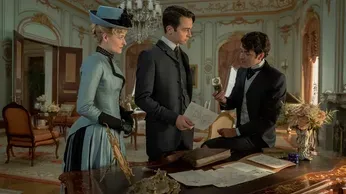
Source: Barbara Nitke/HBO
With American prosperity so challenged, and the gap between the few who have and the many who have not so enormous and getting wider all the time, it was inevitable that comparisons would arise between the "gilded age" of the late 1800s and the first quarter of the twenty-first century.
"I think there are many parallels between 'The Gilded Age' and now," Fellowes allowed. "I think we were very conscious of the fact, certainly when we were making, I think, Season Two and Elon Musk and whoever it was [Editor's note: it was Jeff Bezos] were racing each other to the moon, do you remember, with their rockets and all this sort of stuff.... And we were conscious that we were in another kind of ego world where we've been playing with this idea of everyone that's been virtue signaling, and, 'I'm so upset... the people of [wherever] haven't got enough to eat' and actually, really, the ego world was waiting just below the surface to come bouncing out again. And I think we're living in the middle of that now.
"Everything is so changed," the prolific writer added – though, he noted, "I think it's the job, in a way, when you're making a period drama, [to] point out what's the same."
"The Gilded Age," Season 3, premieres Sunday, June 22, on HBO Max.
